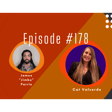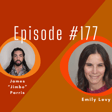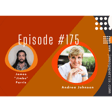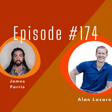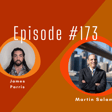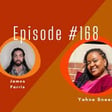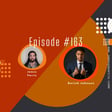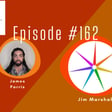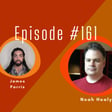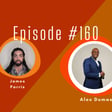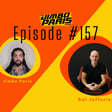Become a Creator today!Start creating today - Share your story with the world!
Start for free
00:00:00
00:00:01

Jimbo Edition #176 - Nick Jain
Nick is a Leading expert on how to make Innovation happen; CEO of IdeaScale; Harvard MBA
Nick has lived an inspiring rags to riches story. Nick started his life by being raised by a single grandmother in a small city in India and graduated at the top of his class from Harvard Business School. Along the way, Nick has worked at some of the top investing firms in the world such as Bain Capital and Greenlight, and has led dramatic business transformations in 3 entirely different industries: trucking, men's shoes, and now B2B software. Nick is an expert at marketing, team management, and creating win-win-win outcomes for his 3 stakeholders (customers, employees, shareholders).
https://ideascale.com/
Transcript
00:00:00
Speaker
All right.
Introduction of Host and Guest
00:00:01
Speaker
Hello everyone. How's it going? Welcome back to the show. I'm James Jimbo Paris. You could just call me Jimbo. And today we have Nick Jane. So how are you doing today? I'm doing great. It's a wonderful day. Thank you so much for having me here. Okay. So to get this started, can you tell me a bit about yourself, who you are, what you're about, sort of What is your message here today for both you know for mainly for you and your platform? Sure. so My name is Nick. I'm the CEO of IdeaScale. We are the largest innovation software company on the planet. Been around 15 years, hundreds of major customers like Pfizer, Comcast, US Post Office, you name it, they usually work with us. um Our software helps large complex organizations become more in ah become and stay more innovative.
Nick Jane's Immigrant Journey and Family Background
00:00:51
Speaker
I think the message that I, there's two messages that I would love to deliver to your audience that I think they would find valuable. Number one, it's really important for everyone to innovate, whether you're an individual on a small organization, large organization, it's actually really critical to innovate and I'll try and explain why. And number two, as an individual, it's really important to invest in continuous learning over the course of your career, even after you've finished your you know high school, college, whatever it is, you got to keep learning throughout your career, otherwise you become irrelevant really quickly.
00:01:21
Speaker
So I'm just curious, what was the beginnings like, your childhood like before all of this ensued? what were your What was your overall vision and how did you sort of become the man that is sitting here today? Sure. So I had a somewhat typical, somewhat atypical immigrant childhood. My parents moved from India to Canada in the 1980s, but I actually, they sent me back to live with my grandmother in India till the age of five. So um yeah ah My earliest memory is age one to five. I was growing up in a small house where water ran half an hour in the day, half an hour in the evening. Not poor, but certainly nothing like the quality of standards we have are fortunate here to have in the West. And then, you know, from age five onwards, I live with my parents in Canada, nice, you know, for ah
00:02:10
Speaker
developed world upbringing, but I think that immigrant mentality has really stayed with me where my parents, my grandparents have made so many sacrifices for me to have the opportunity in life that I have. so that there's always this desire to a you know live up to not their expectations but to make sure that I don't waste or squander the opportunity they've given me as well as pay it forward whether to meet to my own children or to those around me because I'm a big believer that each subsequent generation or each outwards member of your concentric circle benefits from the investments you make in them. What generation immigrants are you?
00:02:47
Speaker
I'm a half-generation immigrant because ah my parents emigrated from India in the 1980s, but rather than being a second-generation immigrant, actually because I grew up in India till the age of five and Hindi was actually my mother tongue, um I'm in a weird like somewhere between first and second-generation immigrant, one and a half generation I call myself. That's fascinating and especially with the um the way America is today,
00:03:14
Speaker
How is it like sort of being an immigrant? Because I know there's a certain level of, and I don't know if you went through this, but there's a certain level of discrimination and issues that immigrants generally have. And I don't know, maybe people would perceive you as, okay, look, you're this well-educated immigrant, you know you have all this going for you. Do you think there was sort of a perception ever, or if there wasn't?
00:03:41
Speaker
Sure, well-educated. My father was a janitor at the local school district. He speaks broken English. My mother worked a blue-slush-white-collar job initially with a factory. Then with the government, read a little bit more educated. I would say, look, at least the town I grew up in, India, I did not perceive any discrimination by virtue of where my family was from, our economic circumstances. It was a very diverse town. My brother and I were the only South Asian kids there, but that didn't matter.
00:04:10
Speaker
I don't know if that's unique to the Canadian experience. I don't know if I was as lucky in the high school or in the elementary school I went to or whether that, you know, I personally was just fortunate, but I, you know, was very fortunate that I was never considered an other, right? My friends were diverse and it was just never something that came to mind. That may be uniquely part of my experience because I certainly do understand that, you know, especially in America, there are more challenges with diversity than some other countries may face.
00:04:36
Speaker
right right and perhaps that's the different view because i was thinking more in terms of america but um that that's very good though that is really good so did you what i'm getting though is you probably did you fit in very well with culture and the people there was it's an easy route sort of fitting in would you say yes and no right like um You know, when when you have parents, you know, one of your parents doesn't speak English and there's certain cultural things that, you know, the food I might get on a specific lunch might be a little bit different. So there's certainly, ah you know, differences, right? You may celebrate different holidays, but that I don't think, you know,
00:05:17
Speaker
That caused any trouble fitting in. I think was a little bit different and perhaps affected me in fitting in. And this is not a racial element or immigration element was the values that I was raised with,
Core Values and Personal Drives
00:05:28
Speaker
right? There was this mentality that you're going to really focus, you're going to work hard even as a kid, you're going to get educated, you're going to move up over time.
00:05:35
Speaker
Whereas I think the town I grew up in, there was very much, you know, a lot of people were solidly middle class, they were doing okay, but there wasn't a desire necessarily to like leave that town, go get educated, do other things. So that mentality that I had probably from the age of five onwards that look, I'm going to go to college, I'm going to work my butt off, I'm going to, you know, create a ah living for myself and be able to support my family.
00:05:56
Speaker
there was probably a little bit more drive, I think, that set me apart. But I don't think that you know made me feel that made made me feel excluded, certainly. I was very fortunate, again, very solid group of friends and very nice community. but That's all good to know. And so this drive that you had,
00:06:14
Speaker
How did this drive come about? Was it mainly from your cultural Indian heritage or did it come maybe, I would say a better way of saying it, maybe it came from a combination of your cultural heritage and also sort of you as a person and your innate goals. And I'm just curious about sort of your innate goals and maybe sure I want to know what sort of the birth of all this came from. I think you said it correctly. It's a combination of factors. Um, but if I was to boil it down, I think there's three things that really drive me. Number one is I like learning. I genuinely, you know, setting aside whether it helps in your career or gets you a fancy job or any of that stuff. I like learning. And so I've read an insane amount of Wikipedia. I studied math in college. I did this because I'm just deeply passionate about this stuff. I'm reading classic books right now, not because I care about it helping me in my career. Nobody cares about poetry from the 1700s. It's just interesting to me.
00:07:11
Speaker
Number two is look, and this is very typical for an immigrant family is You know that your parents made you know just unimaginable sacrifices, especially 30, 40 years ago when you know they didn't have the language skills, education, and transfer over. So you want to make sure you didn't squander the opportunity. So I certainly felt the weight of responsibility that, hey, my parents gave me a tremendous gift. I'm not going to waste. And not just my parents, right? My grandmother made sacrifices to set those up for me. um So I'm not going to squander those.
00:07:43
Speaker
um And then thirdly as a person is a more personal desire. I want to matter. I want to make a difference. And I'm not talking in a fuzzy, you know, ah make a difference, make everyone feel good in the world. I want to matter in whatever sphere of life. And that could be at a small scale or that could be at a global scale. But I want to know that when I leave this world, I've made a difference to some sphere of ah of existence for me. Right. So basically you wanted it to make a tangible impact in your expertise.
00:08:12
Speaker
And again, it can be very small. It can be my neighborhood. It doesn't have to be like Elon Musk. Obviously, that would be great. But somebody I wanted to have made a difference to someone somewhere over the course of my life. Interesting. So I know you mentioned Elon Musk, and you mentioned poetry. Those are some interesting things. what What about poetry sort of interested? Because when I look at you, I sort of think of you as more a technical person. So I think that aspect of poetry definitely adds you know a layer of depth to you. And what types of poetry did you like and what did that poetry really add to maybe you as a person, maybe your vision? Sure. So so look, i my degree is in mathematics, right? I'm extremely technical, you know educated in science. That's my educational and professional background.
00:09:09
Speaker
However, I've spent like an insane amount of time just reading you know poetry, English literature, not just English literature. I've read two of the great four ah four Chinese classical novels, and I hope to read the other two over time. Right now, I think I'm reading Paradise Lost, which is a very, very famous novel from, I think, the 1600s or something.
00:09:29
Speaker
it's uh i don't know if you know the story but basically this priest he goes blind and he starts having these visions at night and dreams and he's blind so he can't write so he wakes up every morning and tells his daughters to transcribe it and it's like a 500 page poem about uh genesis or about you know uh adam the story of adam and eve basically um and look i'm not a religious guy myself but reading this poem you can see that like you can get the sense that God was speaking, you know, something bigger than him was speaking through him at when he was writing this poem, right? So it's it's one the reason I read some of these things, whether it be poetry or literature, is there's just some somebody out there had something really cool to say.
00:10:08
Speaker
that is above and beyond me, above and beyond my capabilities, but just because I cannot generate that form of art doesn't mean that I should not appreciate that art, right? Like I'm also reading Moby Dick. It's my first great classic American novel. And there's just that sense of vibrancy you get when these guys are out on the ocean and like, you know, it's a couple of, it's a bunch of random dudes from all over the world with basically a piece of wood with metal and they're attacking these giant oceanic monsters, right? And it's just conveyed in such a powerful way.
00:10:38
Speaker
When it came to sort of, you know, Moby Dick and sort of conquering those big obstacles, what were sort of the large obstacles you had to conquer in order to begin creating and building sort of this impact that you wanted to create with your own expertise? I'm sorry, could you rephrase the question? I didn't understand what you were asking.
00:11:01
Speaker
What did you need to do in order to start creating this big impact in the world? What were the first few steps and were there any specific obstacles you sort of had to deal with? Look, in some ways I've been very fortunate in life. There are other obstacles I face. I think for me, the obstacles to make a difference are a few things that ah that I observe. Number one is but every time you make a choice in life, you're giving something else up.
00:11:27
Speaker
right If you decide to go for a beer at a bar, you've decided you've you know you could have spent that hour with your loved ones, you could have spent it playing sports, watching TV. right Every choice in life has a cost. ah For me, making a The fact that I want to like make an impact in my sphere of life means I give up other things that i may you know other people may do. I don't actually spend a lot of time watching TV. Even though I'd like to, I know that I i would rather trade off my my priority in life as making a bit of a difference, a little bit more, which means I'd rather work the extra five hours and make it more of an impact and create more jobs for my employees than go watch TV for five hours or or you know go to the pool or watch the football game.
00:12:10
Speaker
Very good. So from what I could understand from what you're saying is you value focus. Focus with purpose, right? Like I'm not sitting there focusing on, I don't know, TikTok dance videos, right? I, uh, partially because I don't, you know, and they don't cause what, ah you know, they don't cause my brain to click. And I don't view them as that funny, but partially because even if I did, I have to make a choice in life.
00:12:36
Speaker
Would I rather spend a couple of hours watching dance videos and cat videos, or spend those hours reading something interesting, spending time with my wife, and doing household repairs? Where what ah where do I want to allocate us time? Because time is an incredibly sparse resource for all of us. like Whether you're young or old, you have a finite amount of time on this planet, you get to choose how you allocate those 36,000 days. Excellent. and Sort of speaking about time and all this, I sort of want to jump back again. What made you want to sort of get more into math? um So look, I showed up at college wanting to study physics. If you want to study any science, you got to take a bunch of math classes.
Academic Interests and Career Choices
00:13:19
Speaker
um And so i as I was taking math class, I was just taking them to be, you know, to get my science degree.
00:13:25
Speaker
And I took this one class that was what I would call like the first pure math class. It's like the type of stuff you see in beautiful mind where you're doing crazy math that is not useful at all in the real world, but it's really cool.
00:13:36
Speaker
And yeah for the first few weeks, I just struggled and struggled and struggled. Had no idea what any of this stuff is, right? It's just crazy symbols. And one night, late one night, literally while playing a beer pong, a game of beer pong in college, it clicked. And all of a sudden I saw this just unimaginable beauty and like, hey, math explains the way the entire freaking universe works.
00:13:58
Speaker
um In a deep, deep way, not it's just not like you mean you are arguing about our opinions, but this is like absolute truth with a capital T. In the same way that, you know, I'm not a musical person, but I imagine some musicians see something in music that, you know, I can't appreciate. I see something in math that gives us a much clearer way of how the universe works and how things should be normatively. And that's, I think, is incredibly cool.
00:14:24
Speaker
That does sound very interesting. And as you began to go deeper and deeper into your expertise in math, what sort of pursued as a career out of this in order for you to eventually become this successful figure? Sorry, again, I didn't understand the question you were asking. Could you could you rephrase the thing? So when it comes to sort of your experiences with math, what sort of led to you kind of expanding more into your career in the future? Sure. So but the bad news about studying math firstly is that ah most of the stuff you study is not actually really useful in the real world unless you become like and a cutting edge computer scientist, right? Not even the average computer scientist doesn't use um math. um When I was leaving college, I had two careers in mind. I could either go become an academic or I could go become an investor on Wall Street.
00:15:17
Speaker
And those do touch different parts of my personality. I'm an extrovert. I'm competitive. I like math. And if you like those three things, you know, academia or um Wall Street is a good indication. I tried out both. I spent some time in research. I spent some time in business and Wall Street. And I realized I really liked the business side of things because A, science is a bit of ah a lonelier profession and I want it to be around people.
00:15:41
Speaker
But B, I think I could have a more meaningful impact in the business world because, you know, you could spend 20, 30 years in science running an experiment and fails. You you know, you leave this earth that I haven't made a mark. In business, I get to know every day whether I'm creating jobs for my employees, creating value for my customer, of creating a cool product for my customers, whether I'm creating value for my shareholders. And that's a good feeling. And if I'm not doing those, then I know that immediately tomorrow that I need to do something different so I can turn that around.
00:16:09
Speaker
Excellent. And this sort of is connecting back to sort of that part about you wanting to have an impact in the world that felt very immediate and tangible. And I think that how I think into entrepreneurship would have and business as a whole would have better appease that interest. Is that what you were thinking sort of?
00:16:35
Speaker
So I've never considered entrepreneurship for the sake of entrepreneurship, um right? I've never desired to be a founder just so I could call myself founder. If therere the way my brain works or the way my personality is, I won't go found a company for the sake of founding a company. If, however, I think that there is a cool idea I have and I'm uniquely situated to go run this business, then certainly I will go find like create the business out of thin air.
Joining and Elevating IdeaScale
00:17:03
Speaker
what But again, my goals in life are not to be a founder, but to make a difference. And so what the the really whenever the opportunity arises, ah for me to specifically make an impact given my strengths and weaknesses, that's where I will gravitate towards. So IdeaScale, for example, I was given a call and said, hey, Nick, do you want to help take this midsize software company to the next stage of its growth? And that's something I think I'm really good at and can make a difference at. And i not and beyond that, I actually really like what the company does.
00:17:32
Speaker
um So that was a perfect fit, right? If somebody had asked me to maybe found that company and I thought I was the right person to do that, I would certainly take it, but I'm not driven to do that just to call myself a founder. Excellent, excellent. And sort of, what do you think your focus more is when it comes to influencing, you know, so so maybe a better way of phrasing this is, were you focused more on B2B success or more B2C? So business to business success, more success compared to how a business sees you or more B2C, more so how consumers see you. So did you care more about the opinions of the businesses or the consumers? That's really what I'm trying to say.
00:18:14
Speaker
Sure. So I've worked in both industries. Prior to IdeaScale, I helped co-run a B2C men's shoe business online, um where we were renting out very high-end sneakers to you know people all over America, for those who are you know Yeezy fans or ah ah yeah know just part of the kicks culture, I should say.
00:18:34
Speaker
Today at IdeaScale, we are a B2B organization. We are selling primarily to almost exclusively to really large complex organizations. Again, the Pfizer's, US Post Office, Transportation Safety Authority, organizations that impact you know people around the world. I think our software is really powerful in impacting them. um To go back to your question about who do I care, ah how they view me, like I personally don't care how anybody views me but i do care that i make an impact to my customers ah organizations right i think i really care about how Pfizer or comcast whether they tell me that i am that idea scale is making a difference in how innovative they are as an organization so about idea scale what is sort of idea scales.
00:19:22
Speaker
main mission statement. Now i'm not I'm not saying a mission statement word for word here, but more so like what is it value necessarily? Sure mission statement is we help large complex organizations innovate faster, better and more systematically.
00:19:37
Speaker
What that means is practically is, look, if you're a large organization, you're probably good at doing something already, right? You don't get to be Pfizer or Comcast unless you're good at doing something. But that's what you're good at doing what was relevant yesterday. You have to do it every day in the world of business. You have to be better tomorrow because if you're not getting better, your competitors certainly are, right? The world doesn't stand still. So every organization, whether you're private sector, or public sector, nonprofit, you have to do new things every day to get better.
00:20:05
Speaker
Our software helps you do that. and We do that in a couple of different ways. What we're most known for, it at least today, is that we help you get all of your ideas from everywhere around your organization. It could be your employees, your customers. ah Get all of the ideas that people have about your organization. Figure out which ideas are good or bad. the same Same as like a TikTok video ranks up or down based on how many people watch it or like it. And then help you turn the best ideas into reality. And the power of this is Unlike the typical organization where it's just the CEO and his or her like 10 closest people sitting in a room and decide what the great ideas are, this allows you to expand your ecosystem from or your catching net to
00:20:46
Speaker
from 10 people to 10,000 people or 100,000 people. And one of our clients, they asked oh hundreds of millions of customers around the world. And when you're tapping the brainpower of hundreds of millions of people instead of 10, you can imagine the potential impact that has on your organization. That is really interesting. you know I've never heard of anything done like this before. do does this does this you know Does this market sort of have any type of competition. Did you ever have to worry about competition or any other companies trying to market this too? Is this something that was just totally new to you?
00:21:26
Speaker
Yeah, so so look, we ah we've been around about 15 years. I think we were the first. um There are certainly about eight or nine other players who do very so or do reasonably similar things as us. I think there's there's four things that make us kind of better and different. Number one, we've been around the longest, like we came up with the idea.
00:21:45
Speaker
and Right. Number two is if you if you go look at the actual software ranking websites like G2 or Gartner, Captera, we're all almost always number one there. Right. So our that's voted by customers. That's not us paying for rankings. That is customer. It's like Yelp reviews for big software companies. Right. Customers are saying we like idea scale. and And then the three other things that we're really proud of is our software is stupid, simple to use. Unlike a lot of complex corporate software, which takes weeks and months to set up, ours takes minutes.
00:22:14
Speaker
Literally, you could go onto a website, click Get Started Free, and you'll be up and running in like three minutes. Number two is ah we actually provide like 24-7 live human tech support. So the age of AI chatbots and stuff, we still talk to you, right? If something goes wrong, you get to talk to a human being. And number three, like we care just to be very blunt. Like when our customer had a problem, I was personally like involved in the bug cleaning process. And there's very few companies where the CEO is personally, on a day-to-day basis, helping a customer solve a problem because they care enough about their customers to do that. Very interesting, and I definitely now understand why this company is mainly a company doing this really wouldn't make any sense whatsoever. yeah Yeah. Again, our software is free if you're like a one-person entrepreneur or a consumer. ah you know Check us out, go but really, our software creates value for the larger organizations, as you just noted.
00:23:09
Speaker
So I'm just curious again too, where does the mathematics come into? It's not to say I don't think it does, it's just more so I don't know. Yeah, so it honestly doesn't that much, right? most Most of what I studied in college is not useful except in two areas. Number one, now that everyone's talking about AI, turns out there's a lot of people who can use AI either because you're talking to chat GPT or you're you're coding new AI engines. Very few people in the world actually understand how the math of AI works.
00:23:37
Speaker
I actually do right because you the amount the amount the the math needed to understand how chat GPT works is like very complicated. And most people haven't spent the like four or five years studying all the deep math needed to do so. That's area number one. that's an Honestly, that's not super useful because I'm not designing the next AI you know engine that's thankfully the people at Gemini or open AI or whatever.
00:24:00
Speaker
um The second area where math does come into handy in the world of business ah is this principle that you learned in math very early is there is a right and wrong answer. It is not a matter of opinion. It is not a matter of what Jimbo thinks or Nick thinks. It doesn't matter that you know Nick is louder than Jimbo or Jimbo is like a foot taller than Nick. None of those superficial differences matter. There is a right answer.
00:24:24
Speaker
And I think that is something that is off really frequently missed in business where we talk in terms of opinions or guesses or gut feels. That's a terrible way to run a business and idea scale. By comparison, we run very, we make business decisions based on like very focused, like there is a right answer and we're going to join arrive at it. And that's true. Whether we're talking an HR decision, whether we're talking a product decision, whether we're talking a marketing decision,
00:24:51
Speaker
There's an actual formula and we make sure decisions are logically determined. And the impact of that, by the way, I'll give one really practical impact of being such thoughtful decision makers. Over the last two or three years, a lot of software companies have shut down or had layoffs. ah Even some of the big tech companies like Google and Facebook have laid off 10, 20, 30% of their staff. IdeaScale staff has grown by 30% in the last two years. That's not hyper growth, but that is still shows that what happens if you actually know how to run a business effectively,
00:25:20
Speaker
to create value for your entire ecosystem. And just so I think the audience can better understand your business more, what are some of your best clients' successes?
Success Stories and Future Plans
00:25:32
Speaker
And could you kind of give scenarios and examples of when IdeaScale really showed its value to you?
00:25:41
Speaker
Sure. so I will give ah two examples. um Number one is, i I can't mention the client's name, but it's one of the biggest fast food companies in the world. You've probably eaten there in the past month. right They have all these professional steps and chefs in-house coming up with new menu items, but they were like, let's go ask our customers. They have hundreds of millions of customers around the world. so They used idea scale to talk to their customers around the world and look for new menu ideas. What should they add to their menu? And they got, you know, thousands of ideas. Some were good ideas. Some were terrible ideas. Amongst the good ideas, some were too expensive that you can't have enough fast food restaurant.
00:26:20
Speaker
But they had imagine, number one, you engaged your customer saying, we care about what you want on our menu. And number two, you got some great ideas out of it. And then ultimately, I think one or more of those items did end up on the restaurant's menu. So you and I got to eat it. And that was a customer-suggested idea. The second, I'll give a personal example from ah how we actually use our own software in-house. We use it to decide what marketing campaigns we run or what product features we develop.
00:26:49
Speaker
And a fun example is we realized that we needed a company mascot. So let's solicit ideas from anyone in the world who wanted to suggest what IdeaScale's mascot should be. You could be a customer, you could be a student, you could be an employee. Everyone submitted ideas. We had a couple dozen really cool ideas submitted. People voted and upvoted, downvoted ideas. And it was actually an employee from South Africa who had just joined the company like three or four months ago, ah whose submission was the winning submission.
00:27:16
Speaker
And that's really cool where like his voice, despite being sitting in a different country, despite me never having met him, his idea ranked ahead of mine. And that's what happened. That's his idea one. In most companies, you don't get to beat the CEO's idea of being a junior employee sitting in a different country. And that happens through the power of our software. That's fascinating. So how is it determined whose idea is necessarily the best or whose idea what, at least in that situation?
00:27:47
Speaker
Sure. Number one, it's called the wisdom of the crowds. People upvote and downvote ideas. And very similar to how like a certain video may show up on your TikTok feed or a certain picture on your Instagram feed, right? A combination of likes, votes, dislikes, comments, et cetera, cause certain ideas to rise to the top.
00:28:03
Speaker
That's number one. Number two is you filter those ideas for hard constraints. Right. So and just because an idea is very popular doesn't mean it's legal, ethical, financially viable, etc. So you may also say like, look, Jimbo's got a great idea, but it's going to cost a billion dollars. So it's impractical for us to go, you know,
00:28:19
Speaker
make a burger that costs a billion dollars, right? Or a gold-plated burger that costs a thousand dollars. um So those are the two dimensions. Number one, you use the wisdom of the crowds and like kind of upvote like a social network feature to figure out which ideas are best versus worst. And number two, you impose upon it certain filtering criteria that come from more top down that just remove out ideas that are like illegal, inappropriate, not practical, take or etc.
00:28:48
Speaker
Excellent. And the way these ideas are filtered in and out, this must be a very you know complex, high-end algorithm or something. I don't think so, right? like the the Well, so the good part of our software is that it's very simple if you want it to be, and it's very complicated if you want it to be, right? And some of our clients love using this simple, like very simply, some add in all sorts of customization. The the algorithm is perhaps is very simple, right? The algorithm at the end of the day says like, people's voices matter more than you appreciate. When somebody says they like an idea or upvote an idea, they usually have a very, very strong reason for doing so because most of the time you don't really care whether, you know, in most things, and most Instagram posts you see, you don't upvote them or downvote them. You look at them, they don't make an impact in your life, you scroll to the next one. When somebody upvotes or downvotes an idea and within your organization, they're expressing a very strong feeling
00:29:47
Speaker
and that's that information encapsulates a ton of information. So for example, i submit I use our own platform, I submit ideas on what our product should be. Imagine what happens when someone downvotes the CEO's idea, right? They're not doing, I mean, somebody somebody might be doing it just because they don't like me, but more realistically, they very thoughtfully like, look, Nick does not know this piece of information that makes his idea a crappy idea, and therefore it's important to communicate that. That's the real power that I think a lot of organizations underappreciate is the in the embedded knowledge and within the human capital of their ecosystem, right? It's the voices of their customers, of their employees contain an incredibly rich set of information that people under tap, under appreciate.
00:30:32
Speaker
How about this reminds me of, it reminds me a lot of this technique called social listen, where you sort of analyze the voices of different, different people who engage with your content and different things that are similar to the content you have to get a better understanding. This really is, it's a social listening on a much higher and more different level with a company in itself. And I think that is just,
00:31:00
Speaker
a Really really cool idea now now sort of the next question I have though is sort of this idea of data, you know companies are very private and very Concerned with that and things like that. So what do you think? Do you think any companies might be afraid that some of these ideas might get leaked or there might be certain issues with this like spies or other things legal competition? So yes, companies are very, very, concern not just companies. We work with some of the you know the largest U.S. government agencies, that you know including some military agencies, some intelligence agencies. You can imagine spy agencies have you know a lot of data that they don't want to get out. So look, we're a legitimate company. We've been around for 15 years. We have what's called FedRAMP certification. That's an incredibly high security clearance. You need to work with the U.S. government.
00:31:48
Speaker
So we know our, you know excuse my language, we know our, um I was going to say, we know how we know what security, right? Like anywhere, any legitimate software company before they even started building software, they figure out the security stuff and do it really well. So we've jumped through, ah not only jumped through all the hoops, but we have all the processes. For example, I'm the CEO of the company. You could steal my phone and laptop and you can't hack our systems because I don't have all the passwords. You don't like one of the simplest things you always do as a well run company is you make sure no one has all the passwords because if they ever get compromised,
00:32:17
Speaker
right, then everyone can access so your own system. So going back to data privacy, number one, our employees can't access your data unless you will unless you give them explicit permission to. Number two, you can make your data as private or as public as you want. So for example, when when we're looking for ideas ideas for our own product, we have two versions of this. One is that you could go to ideas.ideascale.com and see all the submissions by our customers and even our employees in a public form. Those are all the ideas that we're okay with anybody seeing. Our competitors can go see those ideas. It's okay. We don't mind. There's other ideas we think, you know, what's our new killer feature that we don't want the world to know yet. And we, we hide it and our customers can do the same thing. You can even make it so that, Hey, ideas are only, we don't encourage this generally, but ideas are only visible by senior people. Anybody can put in ideas, but only senior people can see them. We think that loses the, you know, the upvoting and
00:33:10
Speaker
feature the function of the software that's really powerful but going back yes data privacy matters number one from a data security perspective like we're really strong you know as should be any legitimate software company but secondly customers can choose their level of privacy and there's a delicate balance between being allowing the power of the crowd to emerge versus keeping your data secret.
00:33:30
Speaker
Excellent. And sort of, you know, to sort of conclude this interview, and again, again, not to conclude and exactly, but sort of to go more towards the end of this sort of thing, what sort of is the future of idea scale. Where do you see this going? And where do you see, more importantly, yourself going? Where is Nick Jane going to be next? Sure. So I've had the privilege of being running idea scale for the past two years. I think it's at a really exciting point in its journey. Over the past year, we've expanded to seven countries. ah We've, you know, increased our head count. We've expanded languages significantly. So
00:34:10
Speaker
I think for me, I would continue love to continue to be at IdeaScale and continue to grow into that next phase of its its journey. For IdeaScale specifically, I think they're the the big thing that's happening now for us, and we literally just announced this this morning, is our long-term product vision. I think our software is really good at addressing part of the innovation problems that ah a chief innovation officer or a large organization faces.
00:34:34
Speaker
But there's other parts right now that our software doesn't do because that's not where we grew out of. So the the plan that we literally just released this morning is, okay, now how do we address the other pain points or problems that our organizations are facing for innovation? Like we we think we solve your idea generation part, but I think we can we also need a module to help you analyze qualitative data. I think we need a module for you to tap experts outside your organization in a structured way.
00:35:01
Speaker
So those are all modules that we are releasing over the next several months. And that will make us a much fuller suite for solving pretty much any problem that a chief innovation officer could have. Excellent. And sort of, do you have a website and Instagram, any other ah accounts that people could sort of look, we yeah we have all the, uh, so, you know, we're on all the social networks.
00:35:23
Speaker
But practically given we're a B2B business, I think the three easiest ways to find us or find out more about us is number one, go to ideascale dot.com. If you're less than a hundred people, our software is totally free. So just click get started free on our website. Secondly, we publish a lot of cool information and webinars on our LinkedIn page, which is ideascale.com slash company slash ah sorry, it's linkedin dot.com slash ah company slash idea scale. Or you can find me personally on LinkedIn. My name is Nick Jane. I'm almost always the first search result if you search my name. All right. Well, thank you for being on the show. It really was a privilege. Are there any other closing words you would like to give to the audience before you go? I'll leave one thought, right? Which goes back to something I said a few minutes ago, which is that in
00:36:12
Speaker
Innovation matters to everyone, right? Whether you're an individual or a large organization, if you're not getting better, you're moving backwards.
00:36:25
Speaker
Excellent. Very well said. Yeah. Thank you everyone for looking at the show. I will see you all next time.
